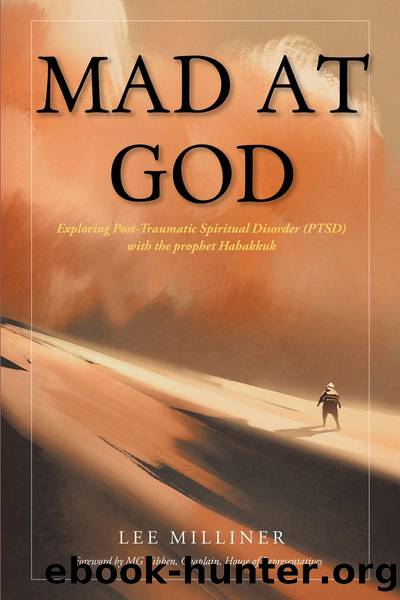Mad at God by Lee Milliner

Author:Lee Milliner
Language: eng
Format: epub
ISBN: 978-1-0980-8422-6
Publisher: Christian Faith Publishing, Inc
Published: 2021-06-23T20:32:53+00:00
Chapter 3
The Praise of the Prophet
Commitment to Celebration
Chapter 3 contains the climax of Habakkukâs experience and the crowning jewel of his book. This final chapter and its concluding psalm complete the book.
This ode is the crescendo of a musical piece written for worship in the temple. Its opening and closing statements indicate that it may have been employed as an independent psalm for worship apart from the book. Its inclusion here, however, is no accident. This chapter brings to a grand and glorious conclusion the concerns and complaints of a faithful and sincere prophet of God. Without it, we have Godâs word for the righteous to remain steadfast, but no revelation on how we are to possess such faith. The book is incomplete without chapter 3; our personal search for answers is incomplete without the message it contains.
The third chapter begins with a title verse: âA prayer of Habakkuk the prophet, on Shinionoth.â The presence of this verse suggests that this section of the book existed independently of the other two chapters. The meaning of âon Shinionothâ is unclear. Scholars agree, however, that the term is likely a musical notation for the singers and/or musicians indicating the melody, tune, accompaniment, or some other musical instruction. The use of Selah in verse 3 is used only here outside the Psalms and appears to be another musical instruction. The final statement, âTo the Chief Musician. With my stringed instruments,â adds further evidence that this psalm was sung in Temple worship as an act of praise to God. It is a psalm of thanksgiving to be sung in joyous harmony by those who, like Habakkuk, have made the successful journey from complaint to celebration. It is Habakkukâs final tribute to the God who is his strength.
Prayer for Godâs Intervention
Following the title verse identifying the writing as a prayer of Habakkuk, there is the only petition in the entire chapter. Verse 2 contains the prayer of the prophet:
O Lord, I have heard Your speech and was afraid;
O Lord, revive Your work in the midst of the years!
In the midst of the years make it known;
In wrath remember mercy.
The prophet trembles in the presence of God. The mighty deeds of God displayed throughout her sacred history to save and discipline Israel produce within Habakkuk a genuine sense of holy fear or âawe.â He has heard the report of what God is planning to do. His people will be disciplined once again; he understands it is now inevitable. But Habakkuk is not finished with his intercession. He prays for the merciful intervention of God.
The âholy fearâ or âaweâ that the prophet felt is not unique to this man of God. Moses stood in the presence of God and was commanded to take off his sandals because the ground was holy. Isaiah envisioned God upon a throne surrounded by an angelic choir singing âholy, holy, holy, Lord God Almighty,â and he fell to his face. Habakkuk stated at the end of chapter 2 that the Lord is in his temple and all the earth should be in silence before Him.
Download
This site does not store any files on its server. We only index and link to content provided by other sites. Please contact the content providers to delete copyright contents if any and email us, we'll remove relevant links or contents immediately.
The 5 Love Languages: The Secret to Love That Lasts by Gary Chapman(9758)
The Space Between by Michelle L. Teichman(6911)
Assassin’s Fate by Robin Hobb(6184)
Wiseguy by Nicholas Pileggi(5744)
Everything Happens for a Reason by Kate Bowler(4722)
Gerald's Game by Stephen King(4623)
Pillow Thoughts by Courtney Peppernell(4261)
A Simplified Life by Emily Ley(4143)
The Power of Positive Thinking by Norman Vincent Peale(4045)
Harry Potter and the Prisoner of Azkaban (Book 3) by J. K. Rowling(3337)
Resisting Happiness by Matthew Kelly(3331)
Girl, Wash Your Face by Rachel Hollis(3270)
Being Aware of Being Aware by Rupert Spira(3262)
The Code Book by Simon Singh(3160)
The Secret Power of Speaking God's Word by Joyce Meyer(3138)
More Language of Letting Go: 366 New Daily Meditations by Melody Beattie(3014)
Real Sex by Lauren F. Winner(3000)
Name Book, The: Over 10,000 Names--Their Meanings, Origins, and Spiritual Significance by Astoria Dorothy(2962)
The Holy Spirit by Billy Graham(2932)
